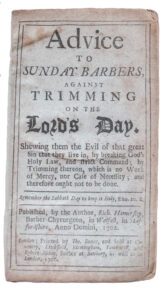
Richard Hamersley was a notable figure in Walsall, Staffordshire, during the early 18th century, serving as both a barber and a surgeon. This dual profession was common at the time, as barber surgeons were responsible not only for haircuts and shaves but also for a range of medical procedures, from bloodletting to surgical operations.
Hamersley’s practice emerged during a period when medical knowledge was evolving but still steeped in tradition. He most likely utilised methods that combined contemporary medical practices with folk remedies, serving his community’s healthcare needs while navigating the complexities of his trade. Barber surgeons like Hamersley played a crucial role in the local economy and social structure, often providing essential health services in areas where formal medical establishments were scarce.
In addition to his surgical endeavors, Hamersley authored a work titled Advice to Sunday Barbers Against Trimming on the Lord’s Day. In this treatise, he admonished fellow barbers against the practice of cutting hair on Sundays, arguing that it violated God’s law and the sanctity of the Sabbath. He emphasized that such work was neither an act of mercy nor a necessity, citing Exodus 20:8 to remind his peers to “Remember the Sabbath Day to keep it Holy.”
While specific details of Hamersley’s life and contributions may be limited, his legacy as a barber surgeon and moral commentator exemplifies the blend of healthcare and ethical considerations that characterized his profession in 18th-century England. Richard Hamersley’s work serves as a reminder of the intertwining paths of medicine, morality, and daily life in historical communities.
For information or if you wish to purchase this book, please email info@butlerrarebooks.co.uk